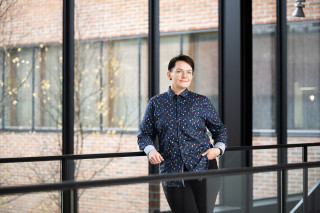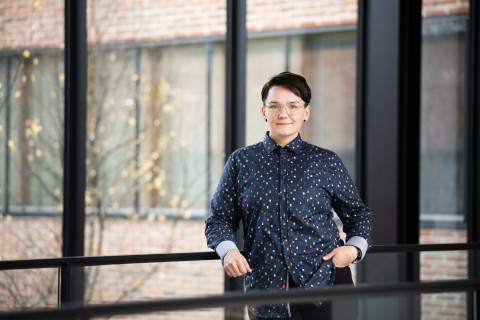Sustainability transition challenges the legal system
Climate law, energy law and environmental law are at the centre stage as the field of law is seeking solutions to the global sustainability crisis. Appointed as Professor of Environmental Law at the University of Eastern Finland this September, Seita Romppanen delves into the challenges the sustainability transition poses to the legal system.
“The sustainability transition poses challenges to law both as a system and as an academic discipline. It is urgent to consider how the sustainability transition can best be steered and enabled through legal instruments. However, there are also various bottlenecks, conflicts and limitations in law that hinder the identification and implementation of the solutions required by the sustainability crisis.”
According to Romppanen, we are facing an enormous challenge as we aim for a genuinely sustainable future, where net emissions are zero, a resource-scarce circular economy prevails and energy systems are largely powered by renewable sources.
“We are currently in a transition that is enabled by law. From the perspective of the legal system, however, we must also start preparing for a post-transition future.”
“During this transition, it is important to ensure that research-based knowledge on sustainability crises is translated into sufficiently ambitious goals in legislation, and that the goals are further turned into feasible and legitimate processes.”
Law is expected to provide comprehensive solutions
As a theme of research, the field of Seita Romppanen’s professorship, i.e., the sustainability transition, is an umbrella for the global sustainability crises the solving of which requires collaboration by all sectors of society. The sustainability transition requires such comprehensive solutions from societies that no single discipline can come up with them alone. No one single entity can solve climate change, biodiversity loss, natural resource depletion or addictive consumption on its own. This comprehensiveness also extends into the field of law and requires the different branches of law to collaborate in order to enable change.
“The sustainability transition changes and reforms law. Change and renewal are not only material but also structural. One of the challenges the sustainability transition poses to law is that, although for example legal regulation can be renewed, the deepest structures of law – such as principles – change very slowly, if at all.”
There are also conflicts in law that are currently slowing down or even restricting the implementation of the sustainability transition. For instance, existing regulation clearly encourages increasing use of wood-based bioenergy and hydropower, but at the same time, we also have objectives that oblige us to increase the carbon sink of forests, reduce the burning of wood for energy and protect the biodiversity of forests and waters. Each of these obligations seeks to solve the same sustainability crisis, in this example from the perspectives of mitigating climate change and stopping biodiversity loss; yet the objectives are contradictory to one another.
“As an academic subject, the task of law is to help identify these conflicts. In a best-case scenario, we legal scholars can identify solutions across different sectors and branches of law, or even coin new legal instruments that could effectively promote both material and structural change by dismantling, for example, such conflicts.”
Thanks to research conducted within projects, it is possible to influence social processes.
Seita Romppanen
Professor of Environmental Law

Projects offer an opportunity to influence social processes
Romppanen is the vice-PI of the RELIEF project funded by the Strategic Research Council at the Academy of Finland, which explores the role of legal systems in the sustainability transition. She leads, as part of her Research Professor role at the Finnish Environment Institute, a work package developing a new approach to assessing needs for change within the legal system in collaboration with ministries, courts of law, authorities and businesses. Romppanen is also responsible for the project’s interaction.
“Thanks to research conducted within projects, it is possible to influence social processes. I’m glad whenever I see research-based knowledge finding its way to government programmes and legislative proposals, or when researchers are invited to be part of legislative investigation or drafting. That’s research impact at its best.”
Romppanen’s professorship is shared with the Finnish Environment Institute, where she works in the Climate Solutions Unit.
“The joint professorship with the Finnish Environment Institute brings a meaningful, practical and multi-level touch to my work on the legal challenges of the sustainability transition from the viewpoint of different sectors, including, for example, the land use sector. In an institute operating under the Ministry of the Environment, I can directly influence the practical activities of my own field of law as part of a multidisciplinary team of experts. Multidisciplinarity also enriches my own research and helps to deepen my own understanding, which stems from a legal perspective.”
Active international collaboration
At the University of Eastern Finland, Romppanen also serves as the Head of Research of the Law School and as the Director of the Doctoral Programme in Law. According to her, the university’s multidisciplinarity is a strength when looking for solutions to the challenges posed by the sustainability transition.
“Multidisciplinarity gives the university an advantage, as it allows us to comprehensively address current social challenges. From the perspective of my own research, the best partners are surprising often found from among our own scientific community.”
Romppanen also emphasises the role of research groups.
“Research is not conducted in a vacuum. Responding to systemic challenges like the sustainability transition has made law, too, increasingly collaborative in recent years – both within the field and beyond. Now, we author more joint publications than before and actively seek collaboration with other Finnish and international research organisations and researchers.”
Inspired by the dynamism of environmental law
A characteristic of Romppanen’s own research is its multi-level and multidisciplinary nature. She has studied various environmental and climate-related regulatory frameworks and legal phenomena at the levels of national, European Union and international law. Lately, she’s been particularly focused on legal issues pertaining to climate regulation in the EU’s forest sector, as well as to renewable energy and critical raw materials, which are very topical also nationally.
“I’m interested in questions related to the legitimacy of climate and environmental regulation, change of law in the sustainability transition and the relationship between science and law.”
When it comes to environmental law, and especially environmental law in the EU, Romppanen is fascinated by its constant renewal and dynamism.
“Environmental law in the EU is a very dynamic field of law. With new information emerging from the subject of regulation – i.e., the environment – there is always something new to study and consider. Regulation is also rapidly evolving. Lecture materials need to be constantly updated and textbooks, too, tend to become obsolete fast. In many ways, the dynamism of environmental and climate law has steered me in the direction of multi-level and multidisciplinary research.”
Seita Romppanen
Professor of Environmental Law, especially sustainability transition, University of Eastern Finland, 1 September 2023–
Doctor of Laws, University of Eastern Finland, 2015
Master of Administrative Sciences, University of Joensuu, 2007
LL.M, University of Iceland, 2010
Title of Docent in Environmental Law, University of Helsinki, 2022
Key roles
Research Professor, Finnish Environment Institute, 2023–
Senior Research Scientist, Finnish Environment Institute, 2021–2023
University Lecturer, University of Eastern Finland, 2015–2023
Postdoctoral Researcher, University of Helsinki, 2018–2019


